Delaware’s free saliva test for coronavirus is a snap — and nothing gets shoved up your nose
The state opened sites to offer quick, easy testing, even for those without symptoms. A WHYY reporter navigated the drive-thru gauntlet.
Listen 3:04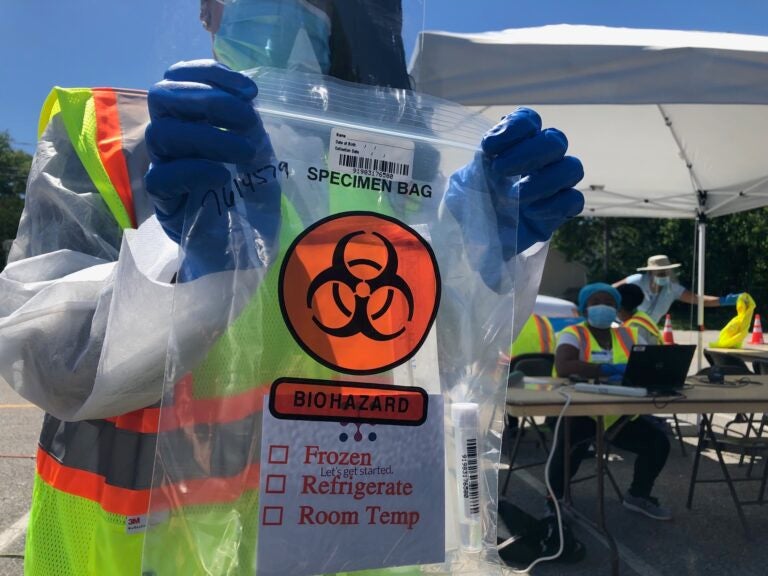
Dalton Carter presents me with the bag marked "Biohazard" that contained the test kit. (Cris Barrish/WHYY)
Are you on the front lines of the coronavirus? Help us report on the pandemic.
Free coronavirus testing sites have sprouted up all over Delaware, ever since the state bought 200,000 saliva-based kits developed by a California company a month ago.
People without symptoms are encouraged to participate in a process that officials have touted for its quickness, ease and lack of discomfort — unlike those invasive nasal swabs that Delaware and much of the nation used when the pandemic first erupted.
So I decided to visit a drive-thru site this week in Elsmere, a town just south of Wilmington, to see for myself.
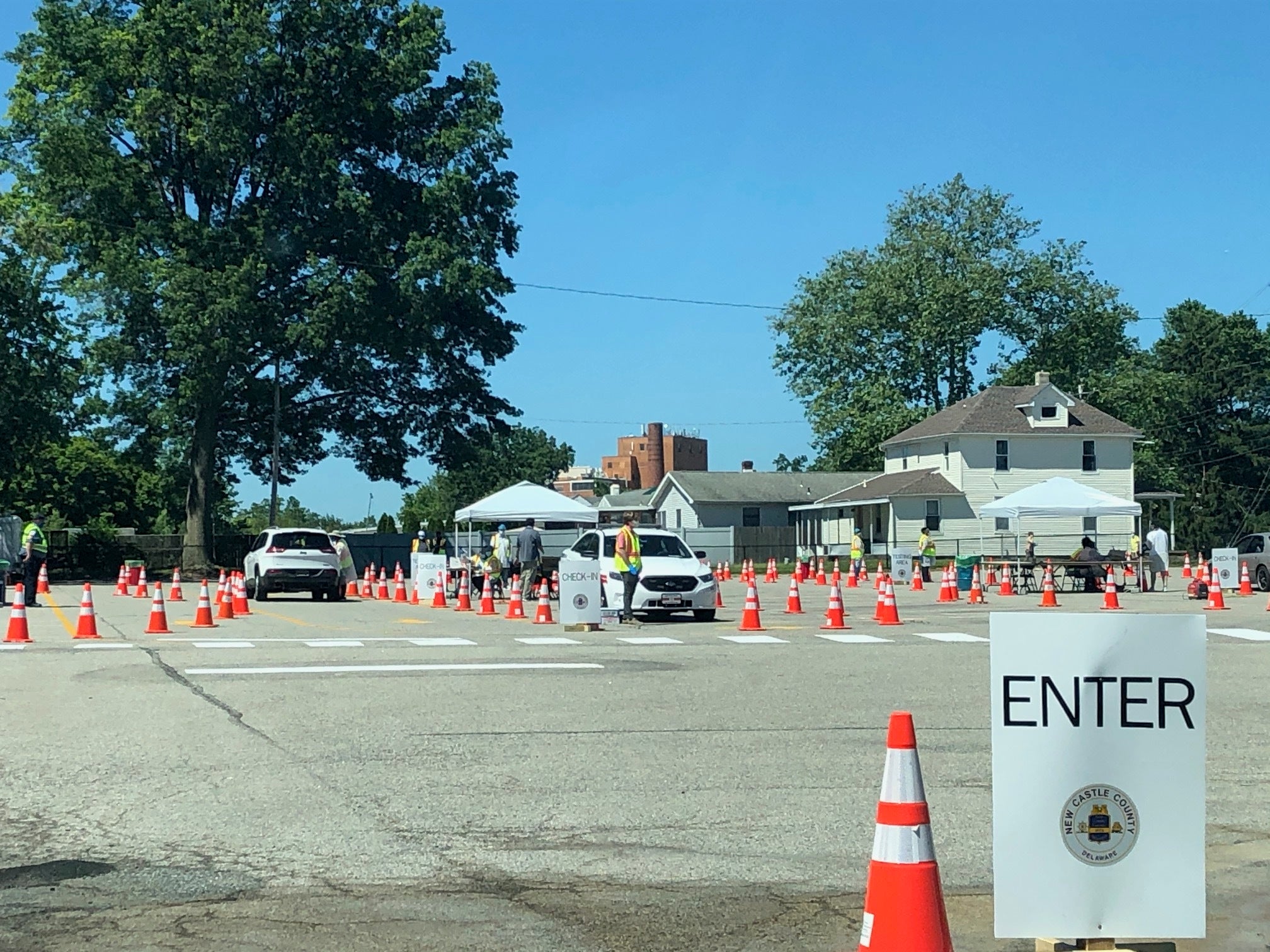
There are only a few cars in line when I enter the testing chute just before 11 a.m. Monday at Baltz Elementary School. Its parking lot has been converted into an assembly line for the free testing. It runs from 10 a.m. to 4 p.m. on this day.
Waiting in a mask and a yellow-orange vest is Christine Merrill. She records my information — including whether I have symptoms.
For the record, I do not.
Merrill assures me this will be “really simple. It’s just a mouth swab.”
I also learn I’m not the only one who has entered the gauntlet with trepidation that — despite the hype and promises — someone hiding behind a mask is going to shove a cotton-tipped dagger down my nose and maybe even into my brain cavity. I know you’ve seen the videos. Ouch!
“We have had a lot of people ask about that,’’ Merrill says soothingly, and relates how earlier that day “there was a little girl that was crying in the back seat of the car. She wanted to do the test, but she was afraid that it was going to be up her nose and all that, and I was, ‘No, no, no.’”
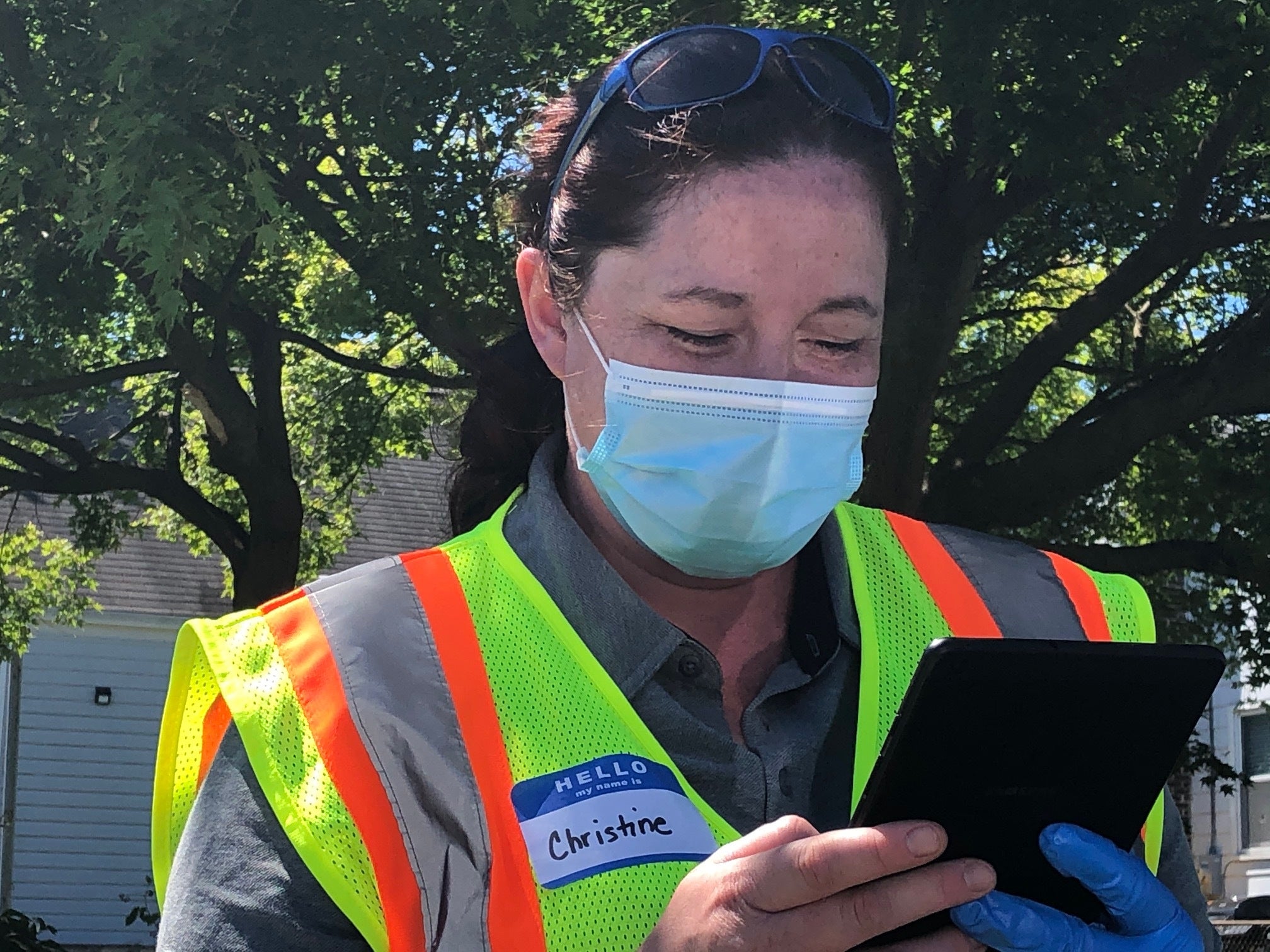
Assured that I won’t be gored, I ask when I’ll get my result. Of course, I want it when I exit the line, but I’m a patient man.
I push for a 48-hour turnaround, but Merrill can only promise that within 72 hours I should find out whether I am positive or negative, most likely by email but maybe in a call.
She sends up the line to Dalton Carter, who hands me a sealed plastic bag marked “Biohazard” in jack-o’-lantern orange.
That description might sound frightening, but it’s really not. I’m told to remove the long plastic package labeled “Specimen Collection Swab.”
Dalton leads me through my paces.
“Now first, you are going to cough a couple of times,’’ he says.
I manufacture a couple of tepid hacks, and he continues: “Now, just take the cotton swab and swab your entire mouth.”
That takes about 10 seconds, max.
He directs me to a capped, tube-like vial in the bag and commands: “Put the cotton swab in and break it off. Shake it a couple of times. Put it back in the bag.”
That’s the only hard part: snapping off the long part of the swab without getting my paws on my precious saliva specimen. But Dalton guides me to a successful snap, then sends me to the final step.
“And you’re going to take it to him in the red trash bag,’’ he says, pointing to a guy holding a big garbage can a few car lengths’ away. “Dump it in there.”
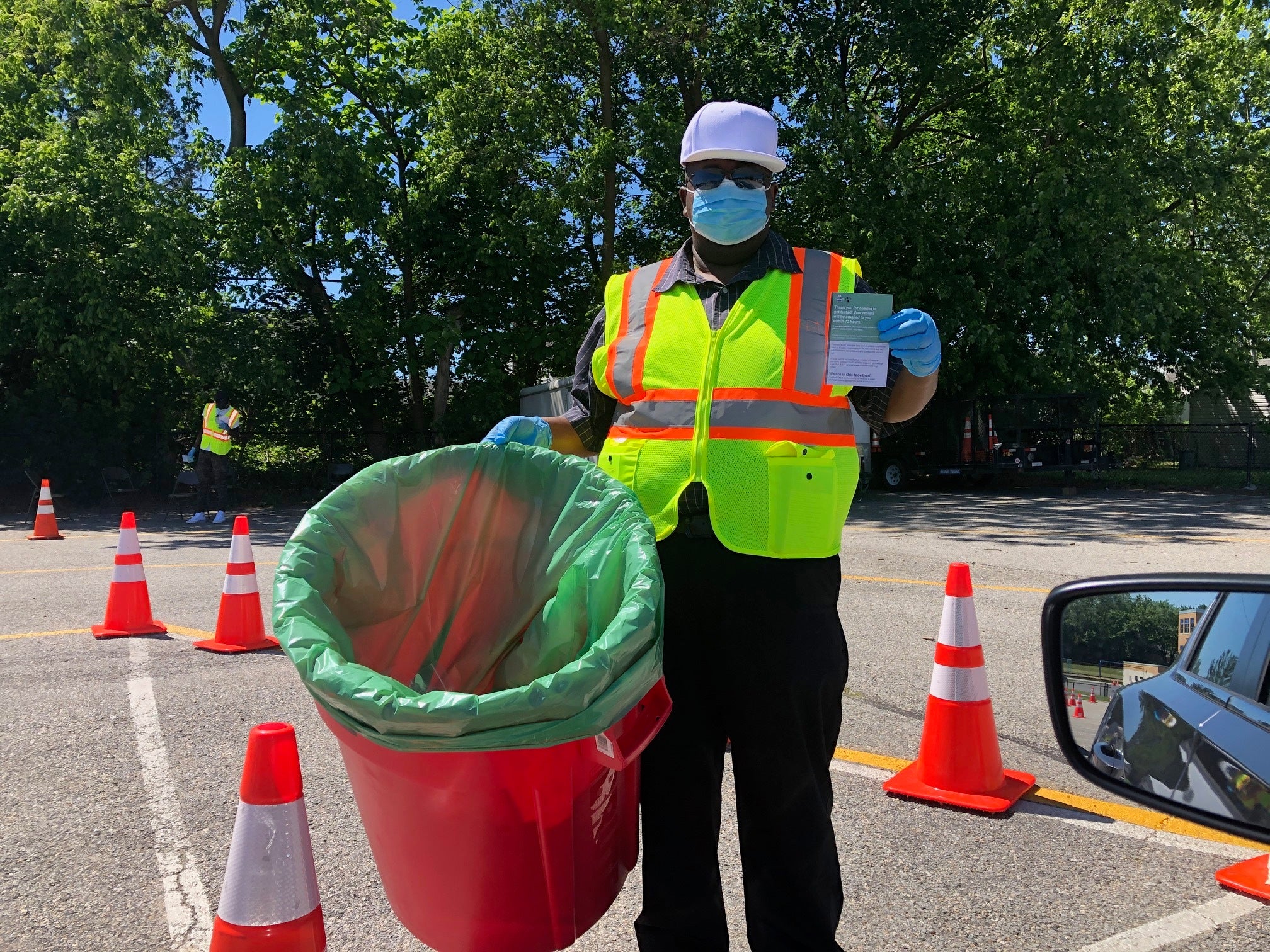
Swish!
And I’m done.
A swift and simple process
It really was a breeze. Twelve minutes total, and I spent half the time blathering about doing a first-person story and taking photos from the driver’s seat. No one even wanted my money or an ID or my health insurance card.
So I’d recommend it. Public health officials want people to get tested.
Beyond letting people who have fever, cough, shortness of breath or other symptoms know whether they have the virus, the free testing can also help persuade asymptomatic people with it to self-quarantine.
And knowing who has the virus will assist the contact tracers the state is hiring to combat community spread. The coronavirus has infected more than 10,000 Delawareans and contributed to the deaths of 400. The state’s infection rate — more than 1 in 100 residents — is one of America’s highest.
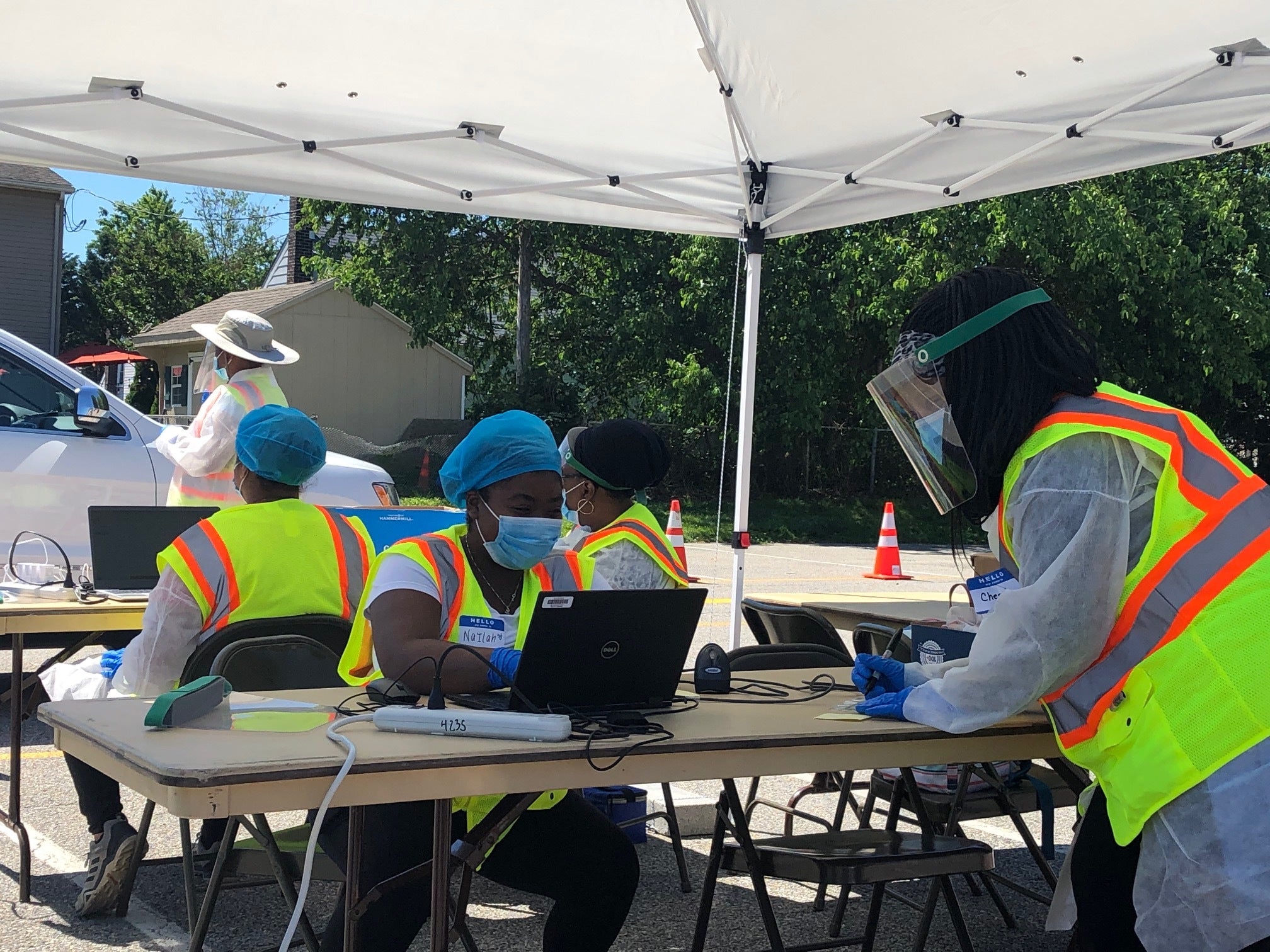
I park and see New Castle County Executive Matt Meyer, holding a garbage can and waiting for a woman to emerge from the line so she can deposit her sample.
Meyer’s office has coordinated 10 testing sites in Delaware’s most populous county to help the state expand testing.
Even behind his mask, Meyer is his usual jocular self.
“Did we stick anything up your nose? Did your nose bleed?” he asks.
“I didn’t stick anything up my nose,’’ she replies with a laugh.
“Easier than brushing your teeth, right?”
“Right,” she responds and motors away.
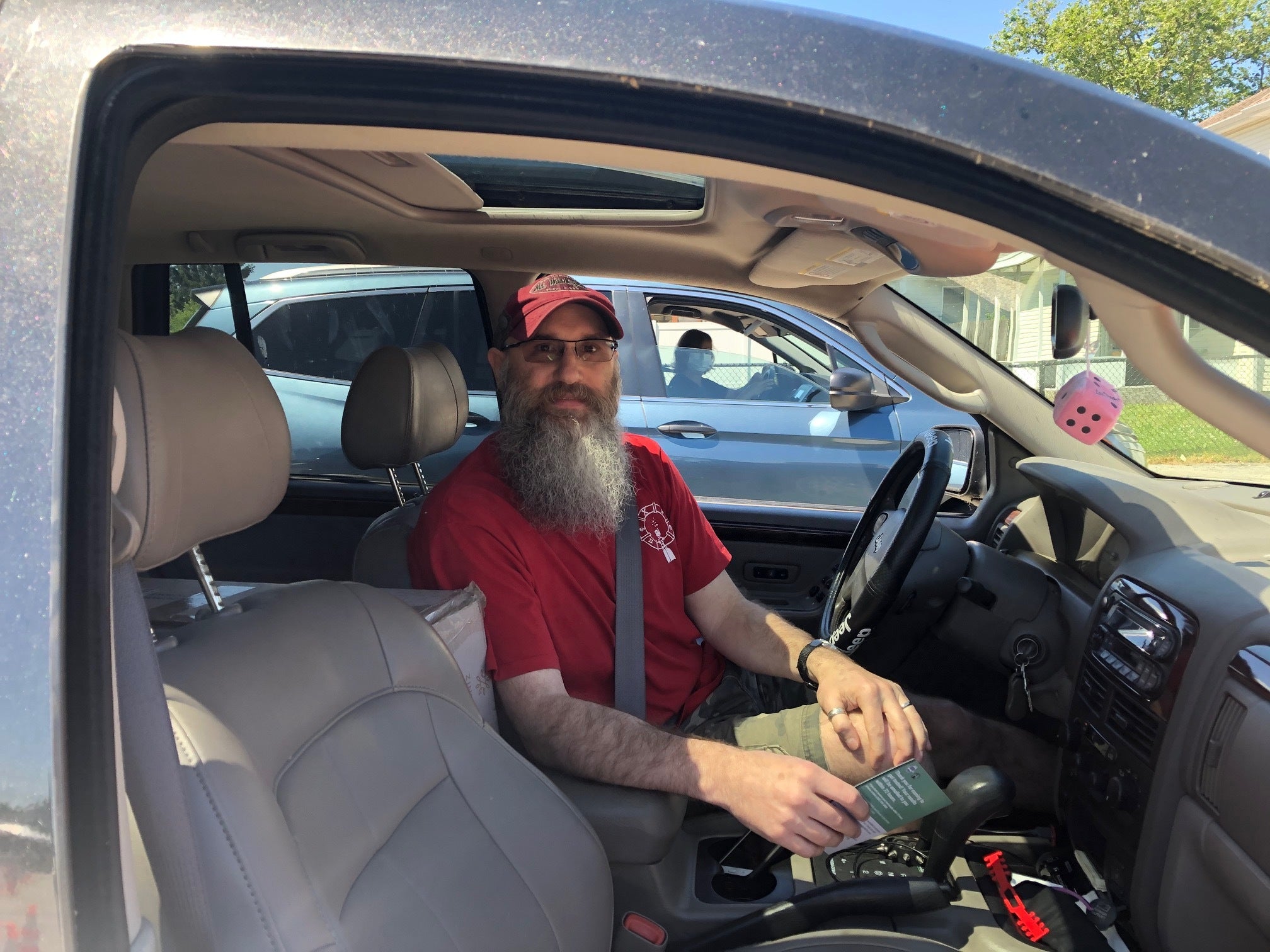
Fellow test subject Troy Sheaffer agrees. He has no symptoms, but he said his wife is a COVID-19 screener at St. Francis Hospital in Wilmington and they have a 4-year-old daughter.
“I did this for my family,’’ said Sheaffer, a software engineer. “The process was great. It was wonderful. Good instruction.”
But will other people come?
On May 8, Gov. John Carney said Delaware had the capacity to test 80,000 people a month. But in the last month, the testing tally has only been half that number.
Only a trickle of cars come to Baltz Elementary on a cool, sunny Monday morning. Meyer expresses concern that people mistakenly think the crisis has passed.
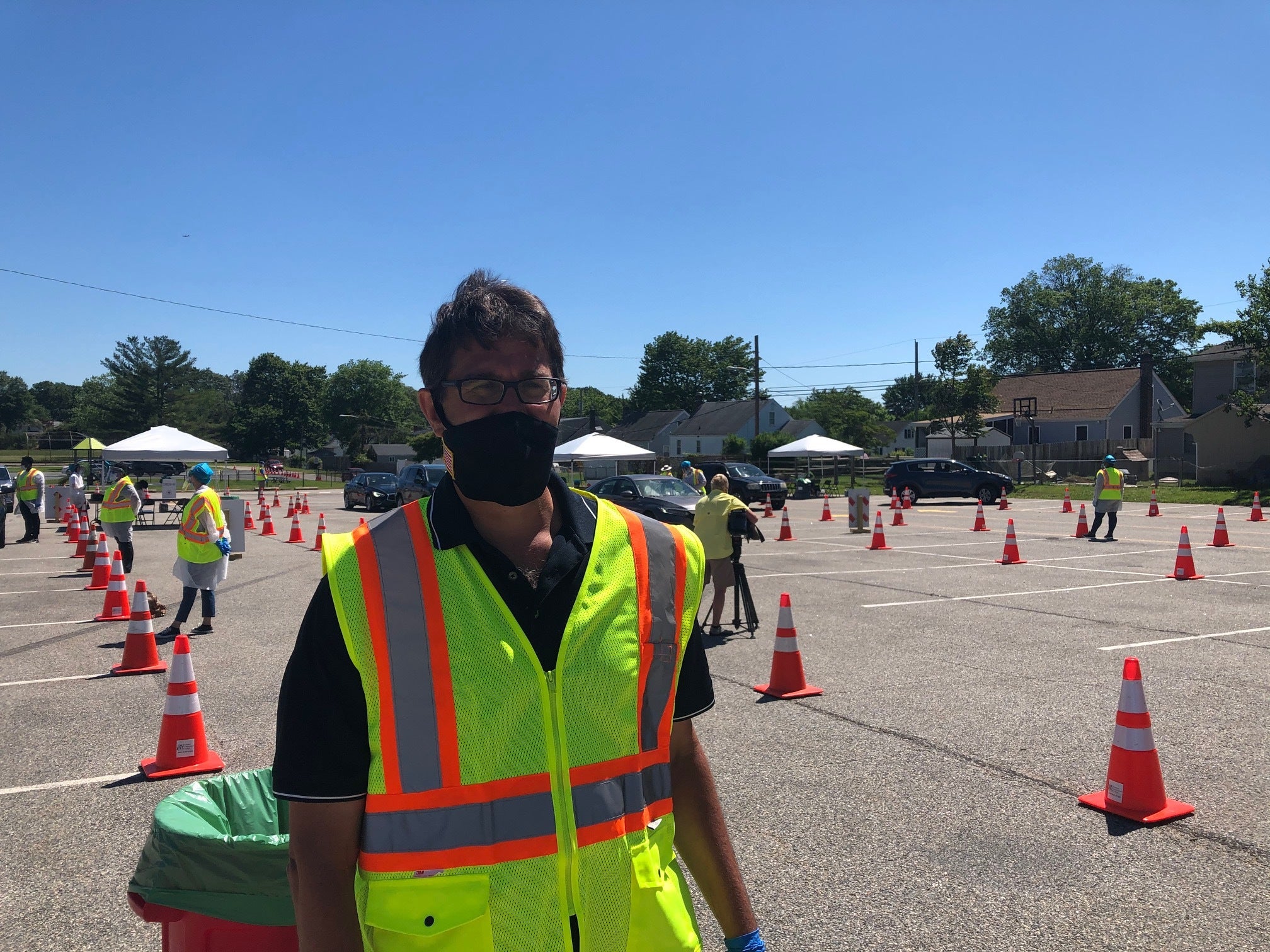
With the number of people in the hospital and the rate of new cases declining, Delaware is well into Phase 1 of reopening.
Phase 2, when most businesses can operate at 60% of capacity, is set to start Monday.
“Getting people out is hard. Mid-March, this thing was top of minds,’’ Meyer says. “Now, as the numbers go down, it’s not as much on people’s radar.”
And the test result is…
Even though I have no symptoms and have been pretty careful — notwithstanding brief but state-sanctioned, rule-abiding visits to the YMCA, clothing store and a hair salon, and time with my equally careful girlfriend — once I got the test, I became preoccupied with the unsettling idea that perhaps I do have the virus that has contributed to the deaths of more than 400 fellow Delawareans.
You never know. Maybe someone in the gym was infected and the air conditioning system sent a particle into my eye duct. Or I walked down an aisle in a grocery store where someone had irresponsibly coughed and droplets wafted over me.
The mind does wander.
But when I woke up this morning (it’s Wednesday) — I had an email from Curative, the testing company that sold Delaware the tests.
It was sent at 3:47 a.m. — less than 41 hours after the test was administered — not the 72 hours I had been told to expect.
Peering with morning eyes into my phone, here’s what I read:
“Thank you for coming to one of our Delaware COVID-19 testing centers. Your COVID-19 test was NEGATIVE. This means that the coronavirus was NOT found in your test.
“We do want to inform you that just like all tests, the COVID-19 test does have limits. If you are feeling cold or flu symptoms, it’s very important that you stay away from others. Please stay at home as much as you can.
Call your healthcare provider and share your test results with them. We ask for you to follow the same instructions as patients who have COVID-19.”
I’m in the clear, at least for now.
The bottom line is, if like me you want to know if you are infected, go online, find a testing site and spend the few minutes it takes to become informed.
It doesn’t cost a penny, isn’t painful, and you probably wait longer in line for an expensive cup of coffee.
WHYY is your source for fact-based, in-depth journalism and information. As a nonprofit organization, we rely on financial support from readers like you. Please give today.



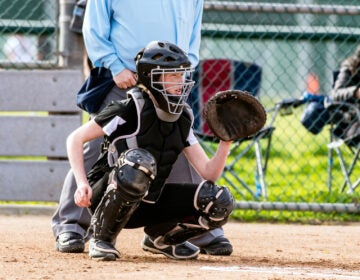

![CoronavirusPandemic_1024x512[1]](https://whyy.org/wp-content/uploads/2020/03/CoronavirusPandemic_1024x5121-300x150.jpg)


